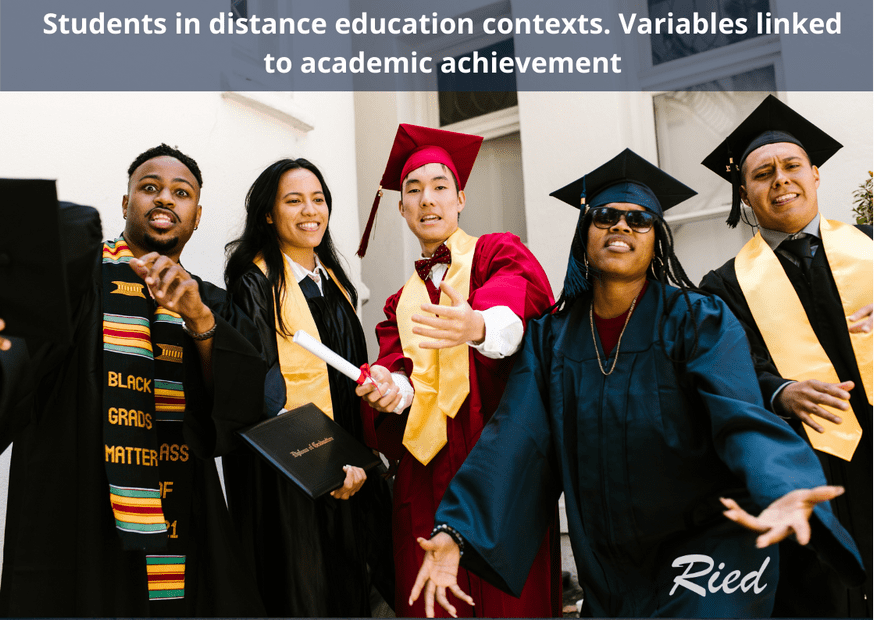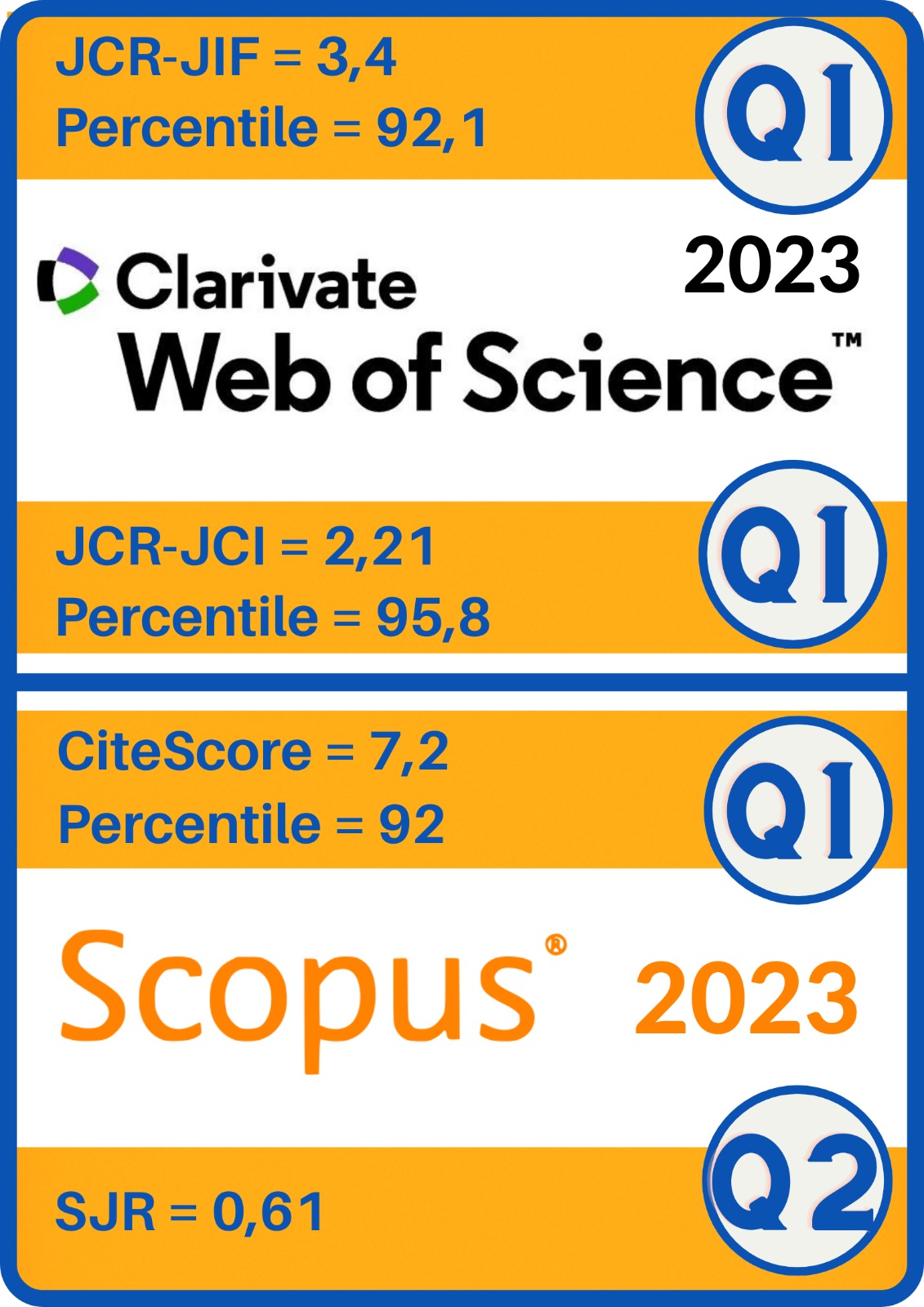Students in distance education contexts. Variables linked to academic achievement
DOI:
https://doi.org/10.5944/ried.22.2.23368Keywords:
education, open university, undergraduate students, high achievement.Abstract
The article takes as a starting point the high rates of dropouts that characterize distance education, in contrast with the low percentages of students who can conclude their degree courses on time. The objective of this article is to analyze the profiles of a group of students of the first year in distance education whose studies could follow the fixed time of their career. A non-experimental and descriptive study was carried out in which first-year students of distance degree courses took part. This group of students fulfilled the condition of having regularized all the subjects included in the curriculum. For data collection, a self-report questionnaire was administered that collects information on personal and contextual variables with possible impact on academic trajectories. The results show that the personal variables which have a connection with achievement include the educational level of parents, the learning goals, and the internal and modifiable causal attributions. Likewise, contextual variables which are considered as promoters of achievement are mainly related to the availability of the professor and the speed to answer queries and offer feedback to the activities proposed. Lines of action are proposed that, based on the results of the study, are expected to contribute to the promotion of student achievement in distance education.Downloads
References
Benett, C. y Monds, K. (2008). Online courses. The real challenge is ‘motivation’. College Teaching Methods & Styles Journal, 4 (6), 1-6.
Carballo Aguilar, O. (2017). Factores que inciden en la permanencia académica de estudiantes a distancia en el nivel superior. Caso de estudio: Licenciatura en Estadística y Sistemas de Información. Revista Iberoamericana de Producción Académica y Gestión Educativa, 4 (8), 1-21. Recuperado de: http://www.pag.org.mx/index.php/PAG/article/viewFile/694/924
Castejón, J. L.; Gilar, R.; Miñano, P. y Veas, A. (2016). Identificación y establecimiento de las características motivacionales y actitudinales de los estudiantes con rendimiento académico menor de lo esperado según su capacidad (underachievement). European Journal of Education and Psychology, 9 (2), 47-88. Recuperado de http://www.elsevier.es/es-revista-european-journal-education-psychology-235-articulo-identificacion-establecimiento-las-caracteristicas-motivacionales-S1888899216300083
Bossolasco, M. L.; Chiecher, A. y Dos Santos, D. (en prensa). Análisis de trayectorias académicas en el primer año universitario. Validación de un cuestionario mediante juicio de expertos. Educación Superior, 27 (1).
Coll Salvador, C.; Engel Rocamora, A. y Niño Carrasco, S. (2017). La actividad de los participantes como fuente de información para promover la colaboración. Una analítica del aprendizaje basada en el modelo de influencia educativa distribuida. RED, Revista de Educación a Distancia, 53 (2), 1-36. DOI: http://dx.doi.org/10.6018/red/53/2
Chiecher, A. (2017). Estudiantes de Ingeniería. Perfiles asociados con trayectorias de logro. En M. Panaia (Coord.), De la formación al empleo. Nuevos desafíos e innovación (71-92). Buenos Aires: Miño y Dávila.
Chiecher, A.; Ficco, C.; Paoloni, P. y García, G. (2016). ¿Qué mueve a los estudiantes exitosos? Metas y motivaciones de universitarios en las modalidades presencial y distancia. Revista Observatorio, 2 (1), 301-326. Recuperado de https://sistemas.uft.edu.br/periodicos/index.php/observatorio/article/view/1965/8716
Chiecher, A y Donolo, D. (2013). Trabajo grupal mediado por foros. Aportes para el análisis de la presencia social, cognitiva y didáctica en la comunicación asincrónica. En A. Chiecher, D. Donolo y J. L. Córica (Eds.), Entornos Virtuales y Aprendizaje. Nuevas perspectivas de estudio e investigaciones (151-198). Mendoza: Editorial Virtual Argentina.
Chiecher, A; Paoloni, P. y Ficco, C. (2014). Ingreso a la universidad en modalidad a distancia. El papel de aspectos motivacionales y cognitivos en la configuración de logros académicos. Revista de Educación a Distancia, 43, 1-25. Recuperado de http://www.um.es/ead/red/43/chiecher_et_al.pdf
Ficco, C.; Chiecher, A. y Bersía, P. (2013). El ingreso en carreras con modalidad a distancia. Descripción de un dispositivo de seguimiento para identificar factores potencialmente desencadenantes del abandono. VI Seminario Internacional de Educación a Distancia. Recuperado de http://www.uncu.edu.ar/seminario_rueda/upload/t15.pdf
Garbanzo Vargas, G. (2007). Factores asociados al rendimiento académico en estudiantes universitarios, una reflexión desde la calidad de la educación superior pública. Revista Educación, 31 (1), 43-63. Recuperado de: https://www.redalyc.org/pdf/440/44031103.pdf
Garrison, R.; Anderson, T. y Archer, W. (2000). Critical inquiry in a text-based environment: computer conferencing in higher education. The Internet and Higher Education, 2, 87-105. DOI: https://doi.org/10.1016/S1096-7516(00)00016-6
Garrison, R.; Anderson, T. y Archer, W. (2003). A theory of critical inquiry in online distance education. En M. Moore y T. Anderson, (Eds.), Handbook of Distance Education (113-128). New Jersey: Lawrence Eilbaum Associates.
Huertas, J. A. (1997). Motivación. Querer aprender. Buenos Aires: Aique.
Huertas, J. A., y Agudo, R. (2003). Concepciones de estudiantes universitarios sobre la motivación. En C. Monereo y J. I. Pozo, (Coords.), La Universidad ante la nueva cultura educativa (45-62). Barcelona: Ed. Síntesis.
Kizilcec, R. F., Pérez-Sanagustín, M., y Maldonado, J. J. (2017). Self-regulated learning strategies predict learner behavior and goal attainment in Massive Open Online Courses. Computers & Education, 104, 18-33. DOI: https://doi.org/10.1016/j.compedu.2016.10.001
Onrubia, J. (2016). Aprender y enseñar en entornos virtuales: actividad conjunta, ayuda pedagógica y construcción del conocimiento. RED. Revista de Educación a Distancia, 50 (3), 1-14. DOI: http://dx.doi.org/10.6018/red/50/3
Ortega, F. (2011). Ingreso a la universidad. Relación con el conocimiento y construcción de subjetividades. Córdoba: Ferreyra Editor.
Park, J. y Choi, H. (2009). Factors influencing adult learners' decision to drop out or persist in online learning. Educational Technology & Society, 12 (4), 207–217. Recuperado de: https://www.j-ets.net/ETS/journals/12_4/18.pdf
Pintrich, P. (2000). The role of goal orientation in self-regulated learning. En M. Boekaerts, P. Pintrich y M. Zeidner, (Comps.), Handbook of Self-regulation. Theory, Research and Applications (451-502). San Diego: Academic Press.
Rivera Montalvo, D. (2011). Factores que inciden en la retención o deserción del estudiante a distancia. Documento en Internet. Recuperado de: http://ponce.inter.edu/cai/tesis/derivera/index.pdf
Romero, M. y Barberá, E. (2013). Identificación de las dificultades de regulación del tiempo de los estudiantes universitarios en formación a distancia. RED, Revista de Educación a Distancia, 38, 1-17. Recuperado de: https://www.um.es/ead/red/38/romero_barbera.pdf
Salinas, M. I. (2017). Gestión de la evaluación del desempeño docente en aulas virtuales de un proyecto de blended-learning. Ciencia, Docencia y Tecnología, 28 (54) 100-129. Recuperado de: https://www.redalyc.org/pdf/145/14551170004.pdf
Sepúlveda, P. (2016). Trayectorias reales en tiempos virtuales. Estudiantes y docentes universitarios desde una mirada inclusiva. Buenos Aires: Universidad Nacional de Quilmes. Recuperado de: http://libros.uvq.edu.ar/assets/trayectorias_reales_en_tiempos_virtuales_-_patricia_sepulveda_(compiladora).pdf

Published
How to Cite
Issue
Section
License
Copyright (c) 2019 RIED. Revista Iberoamericana de Educación a Distancia

This work is licensed under a Creative Commons Attribution 4.0 International License.
The articles that are published in this journal are subject to the following terms:
1. The authors grant the exploitation rights of the work accepted for publication to RIED, guarantee to the journal the right to be the first publication of research understaken and permit the journal to distribute the work published under the license indicated in point 2.
2. The articles are published in the electronic edition of the journal under a Creative Commons Attribution 4.0 International (CC BY 4.0) license. You can copy and redistribute the material in any medium or format, adapt, remix, transform, and build upon the material for any purpose, even commercially. You must give appropriate credit, provide a link to the license, and indicate if changes were made. You may do so in any reasonable manner, but not in any way that suggests the licensor endorses you or your use.
3. Conditions for self-archiving. Authors are encouraged to disseminate electronically the OnlineFirst version (assessed version and accepted for publication) of its articles before publication, always with reference to its publication by RIED, favoring its circulation and dissemination earlier and with this a possible increase in its citation and reach among the academic community.







